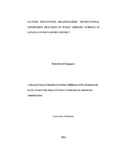| dc.description.abstract | The purpose of this study was to establish factors influencing headteachers’
instructional supervision practices in public primary schools in Longisa
division, Bomet county, Kenya. The study objectives sought to examine the
influence of headteachers’ administrative experience, class sizes, headteachers’
in-service-training and staffing levels on instructional supervision
practices, in public primary schools in Longisa division. The study employed
descriptive survey design. The target population for the study consisted of all
the 69 public primary school headteachers, 69 deputy headteachers and 69
senior teachers in Longisa division. The sample size was 105 respondents.
Consisting of 35 headteachers, 35 deputies and 35 senior teachers. Simple
random sampling technique was used to select schools, whereas the
respondents were picked purposively. Research instruments were self
constructed questionnaires administered to headteachers, deputy heads and
senior teachers. A test retest technique was used to estimate the degree to
which the same results could be obtained with a repeated measure of accuracy.
A correlation coefficient of about 0.93 and 0.84 were obtained for the
headteachers, deputies and senior teachers respectively. After analysis data
was presented using frequency tables. The study established that instructional
supervision practices were influenced by headteachers’ administrative
experience, class sizes, headteachers’ in-service training staffing levels. The
study concluded that the schools’ administrative structures such as the
headteachers, deputy headteachers and senior teachers should be exposed to
various instructional supervision practices so as to be conversant with best
practices of instructional supervision. The study also concludes that large class
sizes adversely affect headteachers’ instructional supervision practices in that
it leads to increased workloads amongst the headteachers. The study further
concludes that headteachers INSET is a critical factor in instructional
supervision since 66.7% of the respondents indicated that INSETs equip them
with relevant knowledge, skills and attitudes necessary for adequate
performance of curriculum supervision roles. The study also concludes that
staffing levels is a critical factor influencing headteachers’ instructional
supervision practices in public primary schools in Longisa division. The study
recommended that the MoEST should mount a comprehensive in-service
training programme to teachers in administrative position so as to expose them
to various instructional leadership roles pertaining to their positions. The
Ministry should also adhere to recommended number of pupils-teacher ratios.
Further the MoEST should determine the minimum levels of experience
before appointment to leadership positions. The study also recommends that
the Teachers Service Commission should post adequate number of teachers to
public primary schools in Longisa division. The study suggests that factors
affecting administrative cadres in public primary schools should be
determined in further research. Also, further research was suggested to be
done to establish training needs in curriculum supervision of headteachers’,
deputies and senior teachers. Factors influencing headteachers’ instructional
supervision practices in private primary schools in Longisa division was also
suggested for further research. | en_US |

